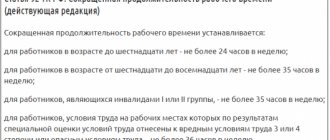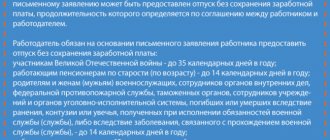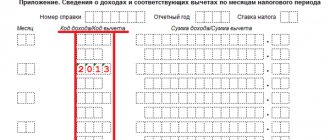Who is granted additional paid leave for irregular working hours according to the Labor Code of the Russian Federation?
So, Art.
119 of the Labor Code of the Russian Federation determines that for employees whose working day is not strictly defined by any time frame, the employer company must, in addition to the standard annual leave, provide several more days of vacation as compensation for such a work schedule. In this regard, the first thing that worries a company that is going to establish an irregular schedule for its specialists is the composition of the people to whom the legislator allows such a schedule to be introduced in principle. The Labor Code of the Russian Federation does not establish a special list of such positions/professions. However, at the same time, it prescribes that the company must approve a specific list of these persons. It can be approved, for example, by a collective agreement, a separate internal agreement or some other internal regulatory document (Article 101 of the Labor Code of the Russian Federation).
Important! An employee must remember that if he is invited to a position that requires periodic overtime, then his employment contract with the company must contain a clause on irregular hours (Article 57 of the Labor Code of the Russian Federation).
In addition, the Labor Code of the Russian Federation defines such a work schedule as the occasional involvement of specialists in overtime work if there is a production need (Article 119). This means that before including any position at an enterprise in the list with an irregular schedule, it is necessary to have a justification that the work function performed by a specialist cannot exclude the occurrence of tasks that will require spending some time outside the standard working hours.
The employee also should not forget that, as follows from Art. 119 of the Labor Code of the Russian Federation, an irregular schedule is episodic work, which means that a company does not have the right to regularly force an employee to work late, even if there is a justified reason for this.
Please pay attention! Working with an irregular schedule is not overtime work (Article 97 of the Labor Code of the Russian Federation), for which the legislator has established a clearer time frame (no more than 120 hours per year), as well as other grounds for involvement (with the written consent of a specialist, while with an irregular schedule, such employee consent is not required).
For more information about overtime work, see the article “When is it permissible to engage an employee to work overtime?”
When is additional leave granted?
In every company, without exception, a vacation schedule is approved at the end of the current year.
This is the schedule for next year. It lists all types of recreation (vacations). They must be paid for, and they are due to the staff.
Additional leave is also indicated in the schedule. It is either attached to the main one, or presented at another time convenient for both parties.
It is also divided into parts (for the whole day). If someone came to the company at the beginning of the calendar year, then, by agreement with the management, rest for performing duties outside of working hours is allowed at a time acceptable for the hired worker.
This type of leave must be formalized by order, just like annual leave. It is paid in the same way as the main one. Only in cases of extreme necessity can a manager reschedule a vacation, but the employee’s consent is required.
Leave for a day of irregular work must be provided according to the vacation schedule or by agreement with the employer.
Procedure and rules for granting leave for irregular working hours
So, as mentioned above, specialists who hold a position with an irregular schedule can count on additional leave for irregular working hours (according to the company’s internal documents).
But here the question arises regarding the duration of such leave. Namely, in Art. 119 of the Labor Code of the Russian Federation, the legislator established the minimum amount of vacation - 3 calendar days. Consequently, a company can provide in an internal document (for example, in a collective agreement) a longer amount of additional leave for irregular working hours.
Please pay attention! The company can set its own duration of additional leave for each individual position that requires work on an irregular schedule.
But how exactly for each individual specialist should the company calculate the number of days of additional leave due to him for irregular working hours? After all, for example, standard annual leave, as well as leave for hazardous work conditions, are provided in proportion to the number of days actually worked by a specialist in the company (for leave for hazardous work conditions - in working conditions that negatively affect his health).
Should a similar, proportional calculation scheme be applied in a situation with additional leave for irregular working hours?
The Labor Code of the Russian Federation does not contain any explanations in this regard. At the same time, the regulatory authorities expressed the following point of view: the basis for a specialist to receive additional leave for an irregular working day is the fact that the employee works in a position that the company, in its internal document, correlates with a non-fixed working day. The legislator does not provide for the condition that the amount of leave provided corresponds to the number of days actually worked according to an irregular schedule (letter of Rostrud dated May 24, 2012 No. PG/3841-6-1).
Therefore, any specialist for whom, by virtue of the internal regulations of the company (and his employment contract), an unfixed work schedule has been established, must receive additional leave for an irregular working day in the full amount that the employer has established for him, even if in fact the employee has never been late at work until late.
ConsultantPlus experts talked about how to provide additional leave for irregular working hours. If you don't have access to the system yet, get a trial online access to K+ for free.
Additional study leave
This type of vacation is divided into two types: with salary savings and without.
- Study leave with pay. This type of rest is provided only to those employees who are enrolled in part-time and evening courses. Simply put, for passing sessions and exams. Its duration varies depending on the course of study. This category includes:
- Students who study at higher educational institutions (vacation duration 30-50 days).
- Students of secondary vocational institutions (30-60 days).
- Citizens studying in primary educational institutions (30 days).
- Citizens studying in schools (9 or 22 days).
- Study leave without pay. This type of rest can be provided to employees enrolled in full-time education. These include:
- Students who study in higher education institutions (15, 30 or 120 days).
- Students of secondary vocational institutions (10, 30 or 60 days).
- Applicants who take entrance exams (10 or 15 days).
- Additional leave for disabled people. There is no additional time off for disabled people. The law provides for 30 days of rest for people with disabilities. In addition to all this, a disabled person has the opportunity to take time off for 60 days a year without pay. If a disabled employee works in the Far North or similar regions, then the corresponding amount is added to the main leave (30 days), depending on the region (8, 16 or 24 days).
The employee needs to notify his superiors about his disability in advance (even during employment). This is necessary to avoid conflicts in the future.
- Additional leave for mothers with many children. The concept of “mother of many children” is defined differently in different regions. For example, in some areas, this requires having at least three children under the age of sixteen. If children serve in the army, then the age is pushed back to eighteen. If children study full-time at universities, then the age is pushed back to 23. But if one or more children reach their 18th birthday, then such a mother is no longer considered to have many children. To be able to receive additional time off, you must issue a document for a large family.
Additional leave is allowed:
- An employee raising a disabled child under eighteen years of age.
- An employee who has two or more children under fourteen years of age.
- A single father raising a child under fourteen years of age.
- A single mother raising a child under the age of fourteen.
Holidays for mothers with many children are issued annually, last at least 14 days and are not paid. If the institution in which the citizen works has a trade union, then the citizen’s children (under fourteen years of age) may be provided with gifts for holidays, tickets to concerts, the circus or theater, and discounted trips to children’s health camps.
- Additional leave for newlyweds. In Russia they want to introduce additional days of rest for employees who have had a wedding. It is allowed to take it within thirty days after the marriage is registered, but not later. Duration – 10 days, time off is paid. But these are just assumptions for now. Perhaps nothing will happen.
Compensation instead of additional leave
In practice, employees often ask for monetary compensation instead of such additional allowance. In this regard, some companies, trying to avoid paperwork, are considering the option of setting out in the company’s internal document a rule according to which an employee who works irregular hours will be paid a certain amount of money by default instead of additional allowance. Is it possible to do this?
The Labor Code of the Russian Federation does not directly prohibit doing this. But, at the same time, in Art. 128 of the Labor Code of the Russian Federation, the legislator prescribed that the employer must replace part of the annual leave that exceeds 28 days if it receives a corresponding application from the employee. And since additional leave for irregular working hours has an annual frequency, it seems that the need for an application from a specialist also applies to such additional leave.
Please pay attention! If the company nevertheless decides to provide for compensation in an internal document instead of additional admission, then it should be prepared for a possible administrative fine. After all, the right to additional leave is a guarantee for an employee’s occasional overtime, which allows him to regain his strength. Therefore, the inability to go on additional leave can be considered as a worsening of the situation of the company’s employees in comparison with the current norms of the Labor Code of the Russian Federation (Article 8 of the Labor Code of the Russian Federation), for which fines are provided under Art. 5.27 Code of Administrative Offenses of the Russian Federation.
Selected questions from employers are considered in the ConsultantPlus system:
Get trial access to the system and get an expert's answer for free.
FAQ
Is it possible to provide in advance?
Additional leave for irregular working hours, like the main annual leave, can be provided to the employee in advance.
This requires the employer's consent.
Is it possible to apply for previous periods?
An employee has the right to take advantage of all vacations for previous periods if they were not provided to him on time.
An employee can use “old” vacations within the framework of the current vacation schedule, or based on an agreement with the employer. Moreover, vacations can be used in any order. Vacations do not tend to “burn out.”
Is it allowed to divide into parts or transfer?
Additional and main leave can be combined, as well as their total duration can be divided into parts.
There are only two conditions:
- the employer's consent is required;
- at least one part of the vacation must be at least 14 days.
For example, Ivanov I.I.’s vacation consists of 36 calendar days, of which 8 days are additional vacation. Ivanov I.I. can go on vacation for 15 days, and divide the remaining 21 days into 5 parts.
It is also possible to reschedule additional leave.
The main thing is that 2 conditions are met:
- the employee and employer have agreed on the transfer of vacation;
- the leave was used before the expiration of 12 months from the end of the working year for which it was assigned.
Is it possible to replace it with monetary compensation?
An employee may ask the employer to replace additional days with monetary compensation. To do this you need to submit an application.
But the employer by law has the right to refuse an employee.
If approved, the amount of compensation is also determined by the employer based on the employee’s average daily earnings for the billing period and the duration of additional leave.
In what cases is it possible for the employer to cancel or refuse registration?
The employer is forced to refuse to provide an employee with monetary compensation instead of vacation if the employee:
- minor;
- pregnant woman;
- works in hazardous production.
Additional leave is a necessary measure to support employees with irregular working hours.
Every employee who has an irregular schedule should be aware of the various nuances of taking additional leave. We hope that this article will help you figure this out.
Attention!
- Due to frequent changes in legislation, information sometimes becomes outdated faster than we can update it on the website.
- All cases are very individual and depend on many factors. Basic information does not guarantee a solution to your specific problems.
That's why FREE expert consultants work for you around the clock!
- via the form (below), or via online chat
- Call the hotline:
- 8 (800) 700 95 53
APPLICATIONS AND CALLS ARE ACCEPTED 24/7 and 7 days a week.
Vacation
Paid leave for irregular working hours for certain categories of employees
A separate and often pressing question for companies is the following: is there a need to provide additional leave for irregular working hours to those specialists who work for the company under any special conditions (for example, are part-time workers or work on a rotational basis)?
Let's start with part-time workers. As a general rule, they work in one organization as their main job, and additionally work part-time in another company. As required by the legislator, such specialists can spend no more than 4 hours a day on their additional work, and in a month, for example, if the “standard” working time is 176 hours, then they can only work 88 hours part-time, i.e. i.e. no more than half (Article 284 of the Labor Code of the Russian Federation).
For time restrictions on part-time work, see the article “Part-time work - how many hours per week?”
Working on an irregular schedule, as already indicated, involves the occasional involvement of a specialist in performing his work function beyond the standard duration of his working day. That is, an irregular schedule in itself suggests that a part-time worker in this case will sometimes work more than 4 hours a day, which conflicts with Art. 284 Labor Code of the Russian Federation.
Please pay attention! A part-time worker, at the same time, can, in some cases, work at an additional job full-time (when the main job does not pay wages, when he has suspended his work by virtue of Article 142 of the Labor Code of the Russian Federation). However, this is rather an exception, and it is unlikely that the occasional involvement of a specialist beyond the standard duration of his working day will coincide with those days when he is released from work at his main place of work.
The courts also note that if a part-time worker has not suspended his work at his main place of work, then in the second company he actually works on a part-time basis, and not on an irregular day (determination of the Supreme Arbitration Court of the Russian Federation dated July 29, 2013 No. VAS-9418/13). Therefore, it seems that if a specialist works part-time in a second job on an irregular schedule, without occasionally suspending his work in the main organization, then his part-time job cannot give him the right to additional paid leave for an irregular working day .
A similar conclusion is true for shift workers. After all, their working time is taken into account cumulatively for the entire period (for example, a month, quarter or year) during which they were at the enterprise and performed their work (summary accounting, Article 104 of the Labor Code of the Russian Federation). It is not possible for the company to determine exactly when such an employee was occasionally involved in connection with production needs. Therefore, if a shift worker is forced to work longer than usual, then this can be qualified as overtime work (Article 99 of the Labor Code of the Russian Federation), and not as an irregular schedule. This means that the shift worker is not entitled to additional leave for an irregular schedule.
Results
Every specialist whom the company has the right to periodically assign to work longer than usual has the right to additional paid leave for irregular working hours. In this regard, organizations should be aware that such leave can only be granted to those specialists whose position, according to the company’s internal document, belongs to the list of positions with non-fixed working hours. At the same time, such specialists should be given leave in full, regardless of how many days they actually worked above the norm; the very fact of working under irregular schedules is important. In addition, some categories of workers are not entitled to additional leave, since their very involvement in work with an unfixed schedule conflicts with the norms of the Labor Code of the Russian Federation (for example, part-time workers, shift workers).
Sources:
- Labor Code of the Russian Federation
- Code of Administrative Offenses
You can find more complete information on the topic in ConsultantPlus. Full and free access to the system for 2 days.
Non-standard schedule
Irregular working hours can be introduced for both full-time and part-time employees. Article 101 of the Labor Code of the Russian Federation clearly explains this point.
An irregular day is a special work schedule, according to which a worker, on the basis of an order from management, works more than his normal working hours.
It is worth noting that at the legislative level there are no restrictions on the use of irregular working hours in relation to certain categories of workers. Therefore, it can be established for minor citizens and pregnant women.











